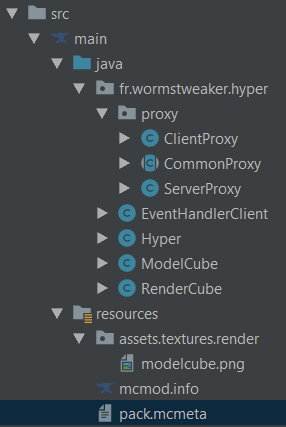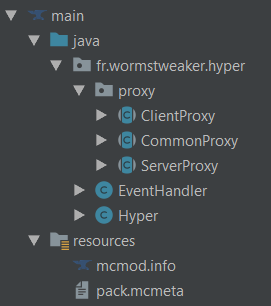
Everything posted by WORMSTweaker
-
[1.12.2] Getting a player capability for render
Okay, removed my set() calls from there What's the proper way to change my values though?
-
[1.12.2] Getting a player capability for render
Yes, but I'm not calling set() in my Provider, I'm calling it in a separate class
-
[1.12.2] Getting a player capability for render
I don't see where or when I'm reading from NBT though Again, I'm a bit lost (but things works like I want them to right now)
-
[1.12.2] Getting a player capability for render
So then, instead of callingsendUpdate() in my set() like this I should instead call it each time after I use set(), like this?
-
[1.12.2] Getting a player capability for render
I'm sending updates each time I'm calling the set/add/rem of my capability, are they reading from NBT?
-
[1.12.2] Getting a player capability for render
I was away for a few days, so sorry for the late response, I think I finally understood now So, before, my instance was created like this: private IPSize instance = SIZE_CAPABILITY.getDefaultInstance(); This is how I've seen every capability instance being created in the examples that I found I suppose that wasn't good, since I can't pass the player this way, so instead i'm doing this: private IPSize instance = new PSize(player); Where player is set trough the constructor of the Provider This should be good (?), but again I'm not 100% sure this is correct, and what's you're expecting me to do The constructor of PSize is simply this and player is used by sendUpdate() that I detailed in earlier posts However, I get a NullPointerException when deserializeNBT() is called, so I suppose that somehow player in the Provider isn't set correctly?...
-
[1.12.2] Getting a player capability for render
Okay hmm... I... do not see how I could pass the player to the capability. Could you give me an example? Because i'm getting a bit lost right now...
-
[1.12.2] Getting a player capability for render
I cannot access PSizeProvider.player otherwise I suppose I misunderstood how you wanted me to store/retrieve EntityPlayer from the Provider And yes I do understand what static means, I just didn't thought about this when I wrote this, sorry
-
[1.12.2] Getting a player capability for render
Okay, I've done it like this I've put this in the Provider And I simply access it like this Doing this do raise some exception tho; so I must be doing something wrong again eh...
-
[1.12.2] Getting a player capability for render
Hmm. I'm having trouble understanding what you want me to do then... Right now, my AttachCapabilitiesEvent looks like this My PSizeProvider class looks like this Knowing this, how can I to my PSizeStorage class?
-
[1.12.2] Getting a player capability for render
I thought you meant the setters of my capability, but I suppose it was something else?
-
[1.12.2] Getting a player capability for render
Okay, now the problem is, by passing EntityPlayer in my setters it break my readNBT() method of my storage class, since i'm calling instance.set(), and now it need an EntityPlayer to be passed I do not see an obvious way to specify it tho, simply using Minecraft.getMinecraft().player doesn't work and simply result in a NullPointerException
-
[1.12.2] Getting a player capability for render
Okay, moved all rendering to a separate class So I just need to remove onPlayerUpdate of my code, alright Sending the packet each time the setter is called EDIT : Okay, the problem is, by doing it like this it break my readNBT method of my storage class, since i'm calling instance.set(), and now it need an EntityPlayer to be passed, I don't see an obvious way to specify it tho Removed sendToAll() Sorry about the copy pasting, bad habit of mine. Moved every similar packet related things into a private sendUpdateMessage() method.
-
[1.12.2] Getting a player capability for render
Where should I move the RenderPlayerEvent? Changed, in my case, is it better to use START or END ? Removed the check How can I check if the value has changed? Should I simply store it temporarily and then send it if the temp value is different than the current value? Applied everything, is this correct?
-
[1.12.2] Getting a player capability for render
Well, somehow it doesn't, I forgot to put it, sorry
-
[1.12.2] Getting a player capability for render
Hello! I'm trying to render a new layer on the player model, which we be scaled differently based on a value stored in the player capabilities. I got the rendering to work, the capability too, but now i'm trying to retrieve the value from the capability to modify on the fly the scaling. However, the capability always return the base value (0.0) when I try to view the player model in the inventory, or using F5, and of course it doesn't work in multiplayer too. What could be the problem? I've attached a screenshot to show the chain of events I'm logging into the player chat. This is my Event Handler The SizeSyncPacket class If you think the problem might be elsewhere than these 2 classes, please feel free to tell me!
-
[1.12.2] [Solved] Unable to load texture onto a model
Oh okay, I didn't knew you were talking about making something like this Anyway, thanks for your help! I'm going to mark this as solved now, and as I said in my first post, look at how layers works, since it seems a bit more appropriated for what I want to do with my model
-
[1.12.2] [Solved] Unable to load texture onto a model
I'm not going to lie, I'm having trouble understanding what you want me to do with getEntityTexture()... I understand that it returns cubeTexture, and also as I read is apparently called when do .bindTextures(), but I don't know how it can help me change the texture itself. Mind developping a bit? Also, please excuse my lack of knowledge on the matter
-
[1.12.2] [Solved] Unable to load texture onto a model
I'm planning on making my model change the way it looks when a certain event happen, and so I just want to be sure that it is the right way to change the model texture I suppose that the change should be immediate? Since I'm calling cubeRenderer.doRender() each frame
-
[1.12.2] [Solved] Unable to load texture onto a model
Yes of course, but I was just saying that since I'm not setting any texture (unless I directly access RenderCube.cubeTextures or use setCubeTextures() ) cubeTextures is null, and that it is normal that I get this null Now again, since I'm trying to change this texture from outside of the RenderCube class, should I simply do something like RenderCube.cubeTextures = new ResourceLocation(Hyper.MOD_ID, "bla/bla/new/path"), or should I do it differently?
-
[1.12.2] [Solved] Unable to load texture onto a model
getEntityTexture() simply returns null,which is expected since I'm not giving any texture to the model inside the RenderCube class, and I want to assign the texture from outside the renderer What should I do to achieve this the correct way? Urgh, again I missed out something this simple, even though I looked at previous code that I made, and countless examples... It does work and load correctly now, when I'm using my weird setCubeTextures() function
-
[1.12.2] [Solved] Unable to load texture onto a model
Okay, removed the @SideOnly Is a check like this a good solution, or should I find another way to do it? This strange setup (as I stated in the comments next to RenderCube.setCubeTextures(texture); ) is to let me change the texture without directly accessing the cubeTextures in the RenderCube class. I agree that it is weird, and probably useless, so I might remove it. Also, if the model isn't assigned a texture, it doesn't render at all, not even with a missing texture pattern. This might indicate that I again did something wrong. Why would you want me to return the texture? Since i'm trying to assign the texture to my model, why should I use getEntityTexture()? My evidence that it does exist, please do not pay attention to the fact that my classes are not organized, I will do that when I'll get a working render:
-
[1.12.2] [Solved] Unable to load texture onto a model
Hello! I'm trying, for now at least, to render a small model onto the player model I first tried to use layers, but then I simply rendered my model on the player entity when the player is rendered. Anyway, for now, my problem is, that my model doesn't have any textures, and that Minecraft simply spit this error: Of course, the file does exist, my path in my ResourceLocation is correct, but still no textures. I register my model entity in my ClientProxy: And I render it on the onPlayerRender event, in my EventHandlerClient: RenderCube: And the model, for good measure: I'm using Intellij, and before you ask, I already tried to put 'idea { module { inheritOutputDirs = true } }' or similar stuff to try to fix this kind of error. If anybody has a clue on what's going on, feel free to respond! And also, if you have some time, maybe you can teach me how to use layers on the player model, as I think it would be more appropriate to use them instead of rendering directly over the player model.
-
[1.12.2] Error when trying to load proxy [Solved]
Oh my god, now I feel like a fool. How did I miss that?... Anyway, thanks for you help, and please excuse my stupidity for not noticing something this obvious ?
-
[1.12.2] Error when trying to load proxy [Solved]
Hello! So, I wanted to get back into modding, but apparently the world is against me today. My problem is, that when starting up, FML simply crashes at the construction phase, claiming that it couldn't "load a proxy". I never had trouble with this kind of error, and I wanted to know if somebody could help me with this. And just so you know, I read and re-read the few classes I have, looked at multiple exemples on proxies and even rewritten my Client, Server, and CommonProxy (since thre's pretty much nothing in them) Here's the crash message : And this is my main class, I checked if the paths in @SidedProxy() to see if they were wrong, and they apparently aren't : As you can see, there's pretty much nothing here for now, and the same can be said for my proxy classes. Those are my Common, Client, and ServerProxy: In term of workspace, I'm working with Intellij Community 2019, and Forge 1.12.2-14.23.5.2838 Attached is the full crash log, and my working folder. If anybody spot something that is wrong, or have an idea of why this is happening, please feel free to respond, and thanks for the help! crash.txt
IPS spam blocked by CleanTalk.



